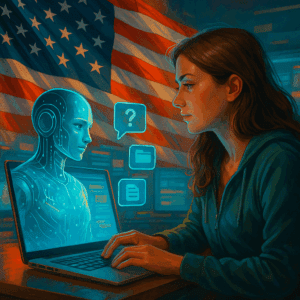What Data-Driven Decision-Making Can Teach Us About Avoiding Chaos

When Emotions Rule, Shutdowns Happen
Government shutdowns are often the result of last-minute negotiations, political gridlock, and emotional standoffs — not exactly a recipe for rational decision-making. But what if decisions of national importance were aided (not replaced) by artificial intelligence? Could the massive troves of fiscal data, historical precedent, voter sentiment, and legislative track records have guided us away from the brink?
That’s the tantalizing promise of AI: it can analyze more data than a human ever could — and do it in seconds. In fact, according to IBM, AI systems can analyze data up to 10,000x faster than human analysts, pulling insights from trillions of data points to simulate outcomes, optimize plans, and surface blind spots source.
In a world where a budget impasse can furlough 800,000 federal workers, delay medical services, and stall critical research, even a small improvement in negotiation prep or decision modeling could make a massive difference.
AI Doesn’t Go on Furlough
While the shutdown pauses government operations, the American people don’t stop needing help. Citizens still visit government websites daily looking for answers: Where’s my application? What form do I need? Is my benefit paused?
Unfortunately, most government websites are still stuck in the past — loaded with static content, outdated FAQ pages, and no way to talk to someone, especially during a shutdown.
This is where AI agents — like the ones we deploy at Vengo — could make a huge difference.
Imagine if every federal agency had a trained AI agent live on their website. Even during a shutdown, the AI could:
- Answer common citizen questions 24/7
- Guide users to the right forms or processes
- Capture citizen concerns in a log for follow-up when offices reopen
- Maintain continuity, even when human staff are furloughed
Shutdowns might be unavoidable, but leaving millions of Americans in the dark doesn’t have to be. An AI agent doesn’t need a paycheck. It doesn’t panic. And it certainly doesn’t clock out.

AI Doesn’t Argue. It Simulates.
Beyond citizen support, AI can help prevent shutdowns too. One of its biggest strengths is scenario simulation. Imagine if every proposed budget decision — tax breaks, cuts, continuing resolutions — could be instantly stress-tested by a model trained on decades of economic, political, and public opinion data. Not just for financial outcomes, but human ones.
These are the kinds of questions AI can help answer — without ego or ideology. And while it wouldn’t remove the need for human judgment, it would inform it with unprecedented clarity.
A study by PwC found that AI could contribute up to $15.7 trillion to the global economy by 2030, largely through productivity gains, smarter decision-making, and reduced friction in high-stakes processes.
What This Has to Do With Vengo AI
No, we’re not suggesting Vengo AI run government negotiations (though we might be faster than Congress 😅). But this is exactly what Vengo does at scale — just for business.
We deploy AI agents that:
- Engage people 24/7
- Answer real-time questions
- Capture key information automatically
- Log every interaction for follow-up
- Work without technical support
And that same model — trained, conversational AI agents with high accuracy — is what every government agency needs if they want to stay connected to the people they serve, especially when the lights go out.

Final Thought: Logic Doesn’t Have to Be Cold
AI won’t eliminate conflict. But it can reduce the chaos by anchoring us to something more objective — logic, pattern recognition, and predictive clarity. In the hands of ethical, thoughtful leaders, it’s not a cold replacement for human agency… it’s a smarter compass.
In the era of shutdowns and standstills, maybe it’s time we upgraded our decision-making systems — not to control us, but to support us. Because when billions of data points can be processed in milliseconds, we don’t need to go in blind anymore.
And we don’t need to leave the American people without answers, either.

